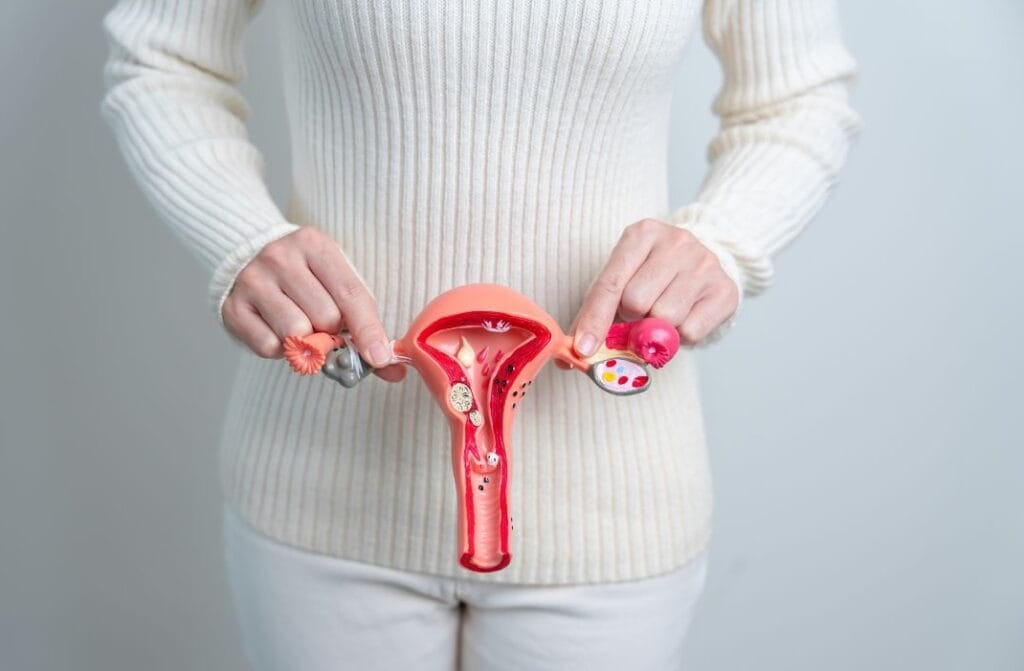Heavy periods, known medically as menorrhagia, can be more than just an inconvenience—they can significantly affect your daily life. Experiencing unusually heavy bleeding for an extended period is not only exhausting but may also indicate underlying health concerns. While heavy periods are common for many women, understanding the possible causes is required for managing your health effectively.
You might be wondering ‘Why are my periods so heavy today,’ we will answer that question along with when it’s best to seek medical advice. Remember, no one should feel they have to cope without support—if any of the causes below sound familiar, speaking to a healthcare professional is a big step toward better menstrual health.
1. Hormone Imbalance
Hormones play a big role in regulating the menstrual cycle, and imbalances can cause significant changes in your period. The two key hormones involved are oestrogen and progesterone. If the balance between them is disrupted, it can lead to heavier or prolonged menstrual bleeding. Conditions like polycystic ovary syndrome (PCOS) are common causes of hormone imbalances and can result in irregular or heavy periods.
Treating hormone imbalances often involves the use of hormonal contraceptives, which can help regulate the cycle and reduce heavy bleeding. However, it’s advised to consult a healthcare professional to discuss the best treatment options for you.
2. Uterine Fibroids

Uterine fibroids are non-cancerous growths that develop in or around the womb. These growths vary in size and number, and they can cause a range of symptoms, including heavy menstrual bleeding, prolonged periods, and pelvic pain. Fibroids can disrupt the normal function of the uterus, leading to more blood loss during menstruation.
Risk factors for developing fibroids include age (they are more common in women over 30) and a family history of the condition. Treatment options can range from medication to help manage symptoms to surgical procedures for larger or problematic fibroids.
3. Endometriosis
Endometriosis is a condition where tissue similar to the lining of the uterus grows outside of it, commonly affecting the ovaries, fallopian tubes, and the tissue lining the pelvis. This misplaced tissue behaves similar to the lining inside the uterus, thickening, breaking down, and bleeding with each menstrual cycle. However, because this tissue has no way to exit the body, it can cause inflammation, scarring, and heavy menstrual bleeding.
In addition to heavy periods, common symptoms of endometriosis include severe pelvic pain and discomfort during menstruation. Diagnosis often involves pelvic exams, imaging tests, or laparoscopy. Treatment options include pain management, hormonal therapies, or surgery in more severe cases.
4. IUDs
Intrauterine devices (IUDs) are a popular form of long-term contraception. There are two main types: hormonal and copper. While hormonal IUDs can often lighten periods, copper IUDs can sometimes cause heavier, longer, or more painful periods, especially in the first few months after insertion. This increase in bleeding is due to the body’s reaction to the copper device.
If you experience heavy bleeding with an IUD, it’s best to consult with a healthcare professional. They may suggest waiting to see if your body adjusts or recommend switching to a different form of contraception if the bleeding becomes too disruptive.
5. Thyroid Disorders
The thyroid gland, located in the neck, plays a role in regulating various body functions, including the menstrual cycle. Both hypothyroidism (underactive thyroid) and hyperthyroidism (overactive thyroid) can lead to changes in your periods, including heavier menstrual bleeding. Women with hypothyroidism may also experience other symptoms, such as fatigue, weight gain, and sensitivity to cold, while hyperthyroidism can cause weight loss, anxiety, and restlessness.
If you suspect a thyroid disorder is affecting your menstrual health, blood tests can help diagnose the condition. Treatment typically involves medication to regulate thyroid hormone levels, which can help restore balance to your menstrual cycle.
6. Medications

Certain medications can contribute to heavy menstrual bleeding. Blood thinners, for example, can increase the amount of bleeding during your period. Hormonal treatments, such as some types of contraceptives, can also affect menstrual flow, sometimes making it heavier. It’s best to speak with a healthcare professional before stopping any medication that might be causing changes in your cycle.
If you suspect your medication is contributing to heavy bleeding, your doctor may be able to recommend alternatives that have less impact on your menstrual health.
7. Adenomyosis
Adenomyosis occurs when the inner lining of the uterus breaks through the muscle wall of the uterus, leading to heavy periods and painful cramps. Unlike endometriosis, where tissue grows outside the uterus, adenomyosis involves the tissue growing within the uterine wall itself. This condition can cause the uterus to become enlarged, resulting in increased menstrual flow and discomfort.
Adenomyosis is often diagnosed through imaging tests such as ultrasounds or MRIs. Treatment options include anti-inflammatory medications to reduce pain, hormone therapies to regulate bleeding, or in more severe cases, surgical interventions.
8. Pelvic Inflammatory Disease (PID)
Pelvic Inflammatory Disease (PID) is an infection of the reproductive organs, often caused by sexually transmitted infections (STIs) such as chlamydia or gonorrhoea. One of the symptoms of PID is heavy menstrual bleeding, along with pelvic pain, fever, and unusual discharge. If left untreated, PID can lead to complications like infertility or chronic pelvic pain.
Treatment for PID typically involves a course of antibiotics to clear the infection. It’s advised to seek medical attention early if you suspect PID, as prompt treatment can help prevent more serious issues.
9. Polycystic Ovary Syndrome (PCOS)
Polycystic Ovary Syndrome (PCOS) is a hormonal disorder that affects how the ovaries function. Women with PCOS often experience irregular periods, which can sometimes be accompanied by heavy bleeding. The condition is characterised by an imbalance of reproductive hormones, which can interfere with the normal menstrual cycle.
Symptoms of PCOS include irregular periods, excessive hair growth, acne, and weight gain. Diagnosis is usually made through a combination of symptom assessment, blood tests, and imaging. Treatment for PCOS can involve lifestyle changes, such as weight management and exercise, as well as medications like hormonal contraceptives to help regulate periods and reduce heavy bleeding.
10. Pregnancy Issues
Pregnancy complications, such as miscarriage or ectopic pregnancy, can sometimes lead to heavy bleeding. A miscarriage occurs when a pregnancy ends before 20 weeks, and heavy bleeding is often one of the first signs. Similarly, an ectopic pregnancy—where the fertilised egg implants outside the uterus—can cause abnormal bleeding and may require urgent medical attention.
If you are experiencing heavy bleeding and suspect it could be related to a pregnancy, it’s advised to seek medical help immediately. Early diagnosis and treatment are essential for managing these conditions safely.
Heavy periods can have a significant impact on your quality of life, and there are various potential causes, ranging from hormone imbalances to underlying medical conditions. Identifying the root cause of heavy bleeding is essential for managing your health and improving your well-being. While some causes, like medications or IUDs, can be addressed with simple changes, others may require more in-depth medical intervention.
If you are experiencing heavy menstrual bleeding, it’s advised to keep track of your symptoms and seek medical advice. A healthcare professional can help diagnose the cause and guide you through appropriate heavy-period treatment options. Remember, support is available, and you don’t have to manage heavy periods on your own


